- Home
- Undergraduate / Department / Graduate School
- Faculty of Nursing
- Department of Nursing
Faculty of Nursing
Department of Nursing

5 or 10 years ahead, acquire nursing practice skills that support people
In an era where change is remarkable and the future cannot be predicted, we need nursing human resources who can act to discover and improve people's health issues. Shimonoseki City University trains nursing professionals who support people living in the Shimonoseki and Kanmon areas to live like that person and live healthy and happy in places where people live, not only medical institutions and medical facilities. .
Learning of Department of Nursing rooted in the community
In order for people living in the community to continue living in their own places where they are accustomed to living, the places where nurses are active have diversified, and are spreading not only to hospitals and facilities but also throughout the region. Shimonoseki City University Department of Nursing learns the essence of nursing and develops the ability to think about and provide care according to the place and situation. Learn nursing rooted in the community as a leader in maintaining and improving the health of people living in the community, preventing disease, recovering early from health disorders, and protecting themselves to the end.
Policy for Graduation Certification and Degree Grant Diploma Policy
- A.
- Knowledge and Understanding
1.Students acquire a wide range of culture to understand diverse people and their lives, society and culture.
2.Students understand the subjects of nursing (individuals, families, groups, and local communities) from various perspectives and acquire basic knowledge to practice appropriate nursing. - B.
- Versatility skills
3.High-quality nursing can be practiced based on scientific evidence for the subjects of nursing (individuals, families, groups, and local communities).
4.Understand the role of nursing professionals in the place of health and medical welfare, and cooperate and collaborate with multiple occupations. - C.
- Attitude and orientation
5.We can respect people's lives, dignity and rights, and act based on ethics and mission as a nursing professional.
6.He has the ability to improve his own nursing practice skills. - D.
- Integrated learning experience and creative thinking
7.We can use information and communication technology correctly to explore nursing.
8.You can think creatively about nursing from a local and global perspective.
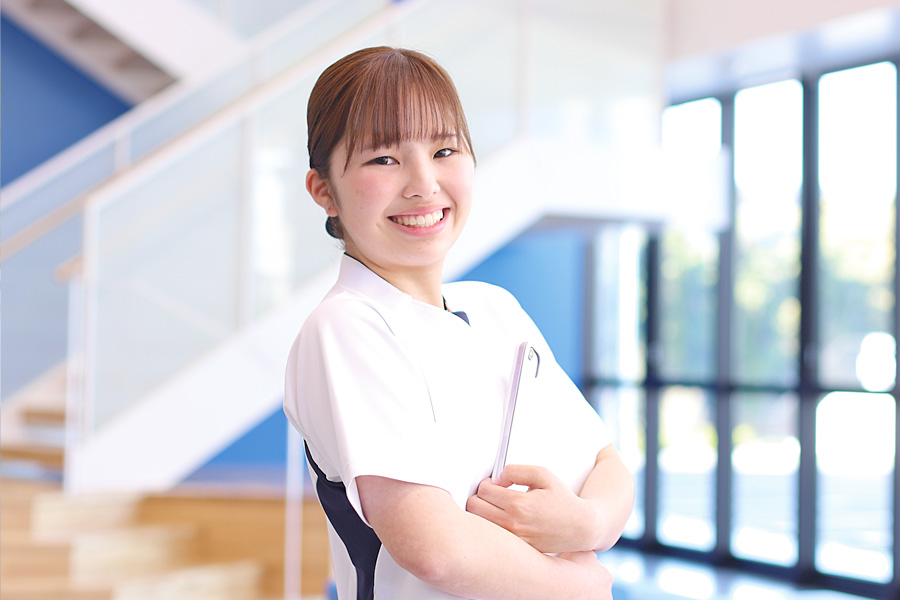
Student VOICE
I want to become a visiting nurse and contribute to solving the aging problem of Shimonoseki City.
Department of Nursing 1 (as of April 1, 2025)
Ai Miyano (from Ogura Nishi High School, Fukuoka Prefectural)
At Department of Nursing, you can acquire cutting-edge nursing skills using the latest equipment and equipment. Courses are also diverse, and we are not looking forward to classes such as communication theory and careling in order to enhance the non-cognitive skills necessary for future nursing staff. In the future, I would like to become a visiting nurse and contribute to the community, but in order to improve my wide range of abilities as a nurse, I would like to interact with students from other faculties, participate in volunteer activities, and gain various experiences I am.
Policy for organizing and implementing curriculum Curriculum policy
- 1.
- In order to acquire a wide range of culture and cultivate a foundation that can understand diverse people and their lives, society and culture, we will assign basic education subjects and liberal arts education subjects. Basic education subjects are "foreign languages", liberal arts education subjects are "liberal arts" (humanities / social sciences / natural sciences / life / health sciences / human rights / symbiosis), and "Shimo Kwansei Gakuin" are arranged. By taking a wide range of courses from all fields, we will capture the diverse values of nursing subjects with a rich mind and flexible mind, and cultivate human ability to accept diversity.
- 2.
- In order to understand the subjects of nursing (individuals, families, groups, and local communities) from various perspectives and to cultivate a foundation for practicing high-quality nursing based on scientific evidence, the specialized basic education subjects are systematically arranged for subjects related to the structure and function of the human body I, II, III, IV, pharmacology, nutrition and metabolism, as well as subjects related to the social security system.
- 3.
- Lectures, exercises, and practical training courses in specialized education subjects will be systematically arranged in order to practice nursing independently based on specialized knowledge and scientific thinking. Specialized education subjects are organized in five subjects: "basic nursing", "clinical nursing", "nursing for children and families", "local nursing", and "integration of nursing". We will assign courses such as "Life Stage and Healthcare Overview I/II", "Pediatric Healthcare Methodology I/II", "Adult Healthcare Methodology I/II" and "Adult Healthcare Methodology I/II" to study healthcare as nursing that supports healthy and healthy lifestyles. "International Health and Nursing" will be assigned so that health issues can be considered from a regional and global perspective.
- 4.
- In the practical training, taking advantage of the characteristics of public universities that are closely related to the community, we will cultivate the foundation of the ability to think about the health of local residents by conducting practical training in Shimonoseki and surrounding areas, including `` practical training on living and the community '' . In addition, at the end of the third year on-site training, in order to understand the expertise of nursing and acquire the ability to cooperate and collaborate with multiple occupations in various health and medical welfare places, `` Multi-occupational Cooperation Training '' Will be placed. Furthermore, in the 4th year “Integrated Nursing Training”, we will set and practice practical training tasks on our own to develop self-improvement skills to enhance ethics and mission as a nursing professional, and nursing practice skills.
- 5.
- In order to acquire basic knowledge and skills that can properly utilize information and communication technology (ICT) in the field of health and medical welfare, "Computer science", "Computer utilization I / II" "Information literacy" and "Programming" are assigned as compulsory subjects, and "Nursing Informatics" are assigned as specialized basic education subjects. Utilizing these knowledge and skills, we will develop the ability to search for nursing and think creatively through "Introduction to nursing research", "Nursing research exercises", and "Integrated nursing training". Furthermore, in order to explore nursing that is important with the expansion of ICT utilization, "Information and Communication Technology and Nursing" will be assigned to specialized education subjects.
- 6.
- In lectures and exercises, various learning methods such as the use of ICT and active learning will be adopted according to the class form. Based on the Diploma Policy, the evaluation of the results of Osamu Gaku will be rigorously evaluated according to the grade evaluation criteria set for each subject. By introducing a portfolio, we will visualize Gaku Osamu and enable students to evaluate themselves.
Educational Curriculum
| 1 year | 2 years | 3 years | 4 years | ||
|---|---|---|---|---|---|
| Dedicated Gate Teaching Raising |
Health Promotion* Care ring* Summary of Nursing Communication Theory * Nursing Career Design* Life assistance technology |
Health assessment Medical assistance technology The nursing process Nursing management and medical safety Nursing ethics Life Stage and Healthcare Overview I Life Stage and Healthcare Overview II Adult Healthcare Methodology I Geriatric Healthcare Methodology I Geriatric Healthcare Methodology II Childhood Healthcare Methodology I Women's Health Care Methodology I Mental Healthcare Overview Mental Healthcare Methodology I Regional and Home Healthcare Overview Regional and Home Healthcare Methodology I Summary of Public Health Nursing Introduction to Health Behavioral Sciences* Health Behavioral Methodology* Public Health Nursing Activity Theory I* |
Adult Healthcare Methodology II Introduction to nursing research Childhood Healthcare Methodology II Women's Health Care Methodology II Mental Healthcare Methodology II Regional and Home Healthcare Methodology II Comprehensive nursing technology exercise Public Health Nursing Activity Theory II Public Health Nursing Activity Theory III School Health* Care Overview* Health consultation activities* |
Cancer nursing Disaster Nursing Family Nursing Rehabilitation nursing* End of Life Care* Emergency Nursing* Infection nursing* Nursing theory* Nursing research exercises International Health and Nursing Health policy theory* Information and Communication Technology and Nursing |
|
| Fruit Shu Department Eye |
Practical learning about living and community | Basic Nursing Practice I Basic Nursing Practice II |
Adult Healthcare Practice I Adult Healthcare Practice II Geriatric Healthcare Practice I Geriatric Healthcare Practice II Child Healthcare Training Women's Health Care Training Mental health care training Multi-occupational cooperation training |
Integrated training in nursing Local and home healthcare training Public Health Nursing Practice* |
|
| Dedicated Gate Group Foundation Teaching Raising |
Structure and Function I of the Human Body Structure and Function of Human Body II Clinical Pathology I Clinical Pathology II Start-up seminar Pharmacology Nutrition and metabolism Public Health |
Nursing Informatics Clinical Pathology III Clinical Pathology IV Health and Medical Welfare Administration Multi-occupational cooperation theory |
Epidemiology and Health Statistics* | ||
| Teaching Nouri Teaching Raising |
Humanities Social Science Natural Science Life and Health Science Human Rights and Symbiosis Career Education Foreign training Shimo-Kwansei Gakuin |
||||
| Group Board Teaching Raising |
Foreign language Information and mathematical First Annual Education |
||||
*Elective Subjects
※The curriculum is subject to change.
※Education and basic education are classified as subject categories.
Licenses and qualifications that can be obtained
Acquisition of examination qualifications
● Nurse National Examination Qualification
● Public Health Nurse National Examination Qualification (by taking a separate public health nurse course)
License and qualification
● A type of nursing teacher's license (according to a separate teaching course)
● Two kinds of nursing teacher's license (application after obtaining a public health nurse's license)
● Type I hygiene manager's license (application after obtaining a public health nurse's license)
The expected course
● Medical institutions
● Administrative agencies (health centers, health centers, etc.)
● Companies with Health Management Offices
● Nursing teachers (elementary school, junior high school, high school, etc.)
● High-school education (midwife training institution, graduate school, etc.)
Overview of Nursing Education Program
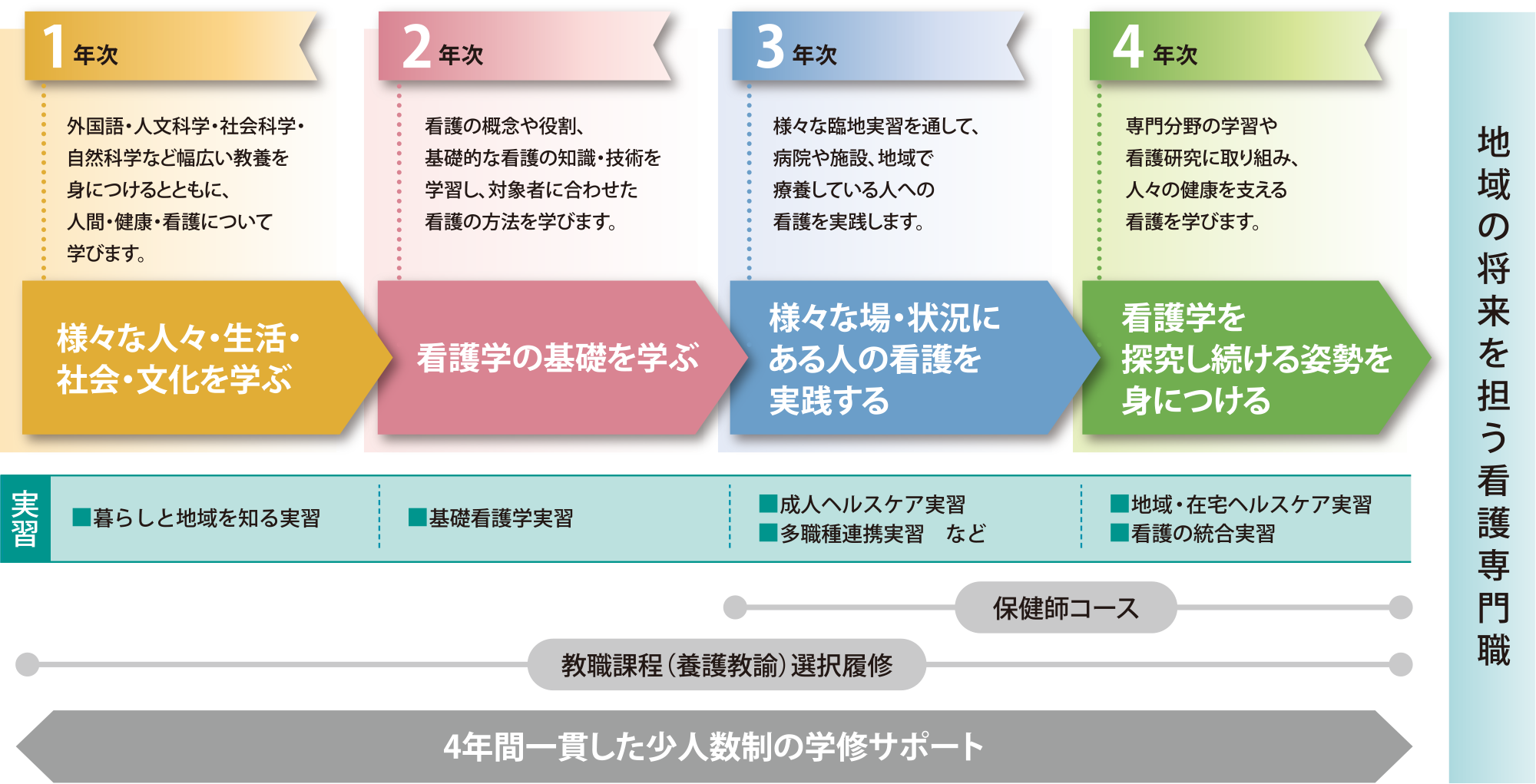

Unique Subjects of Faculty of Nursing
As a member of the health and medical team, students will learn the actual situation of related occupational cooperation in a comprehensive community care system centered on patients and users. Beyond the framework of practical training places (ward wards and facilities), we will learn about the expertise of various occupations related to the health and medical welfare of people and explore cooperation.
Power to acquire
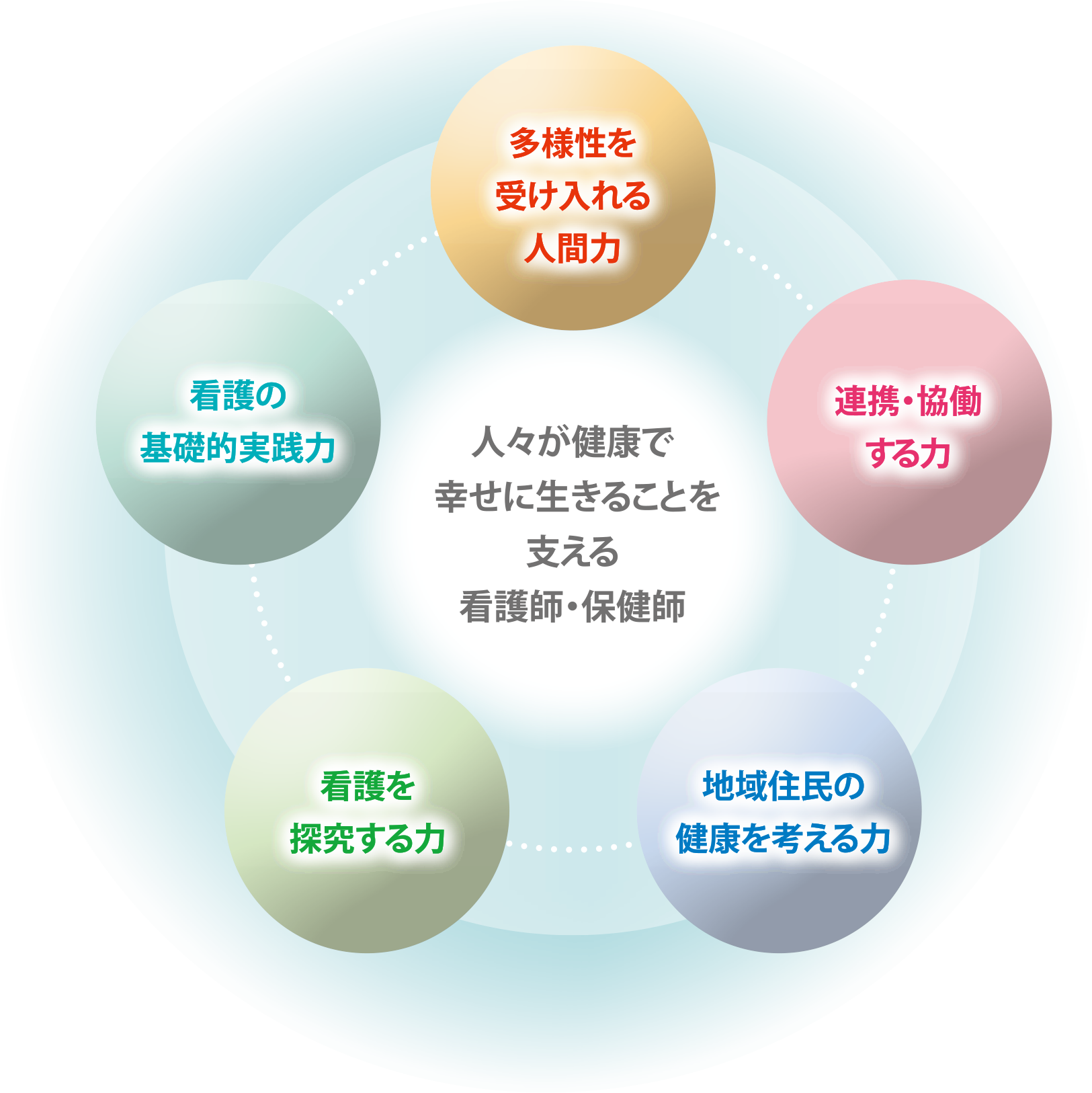
Faculty of Nursing New School Building
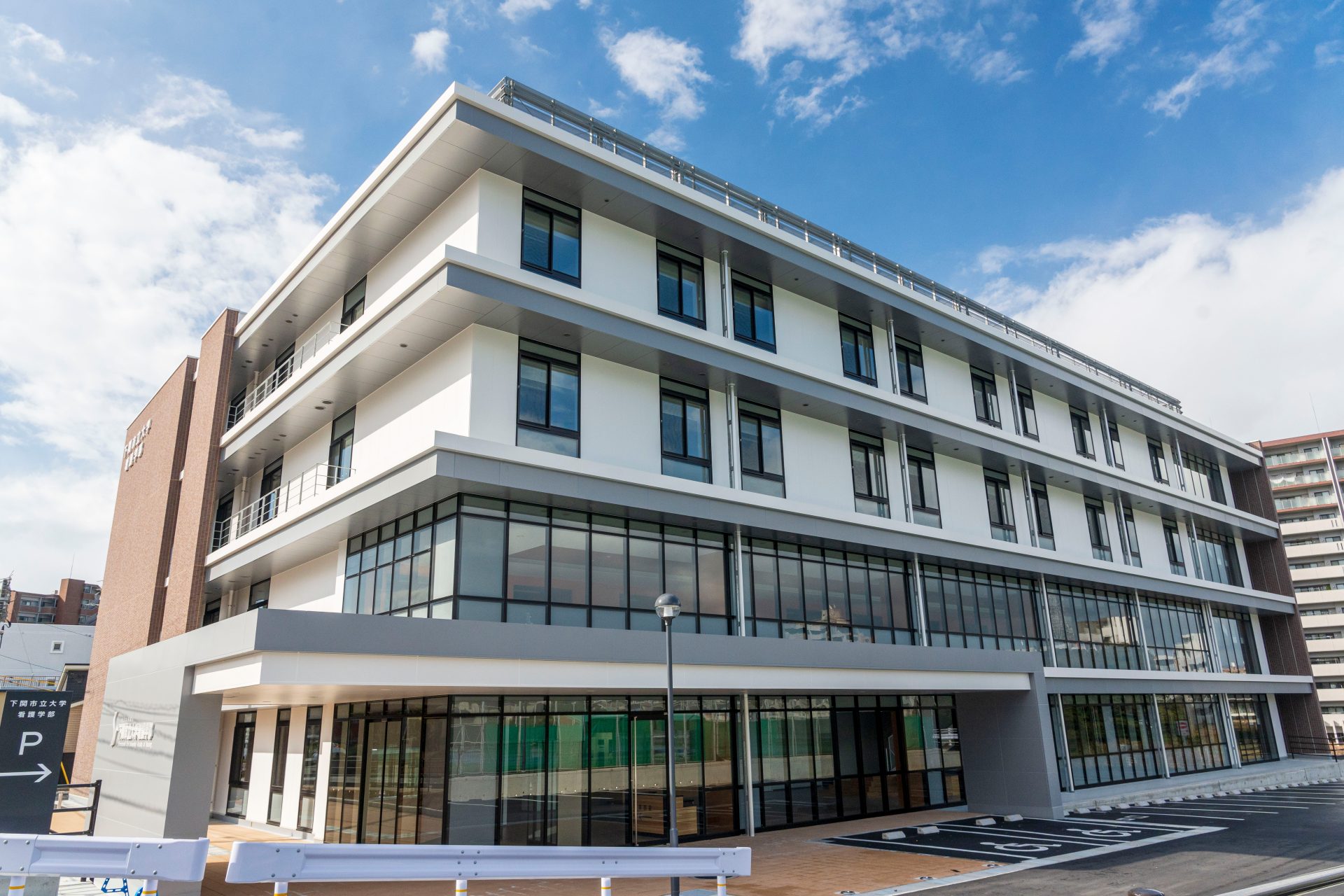
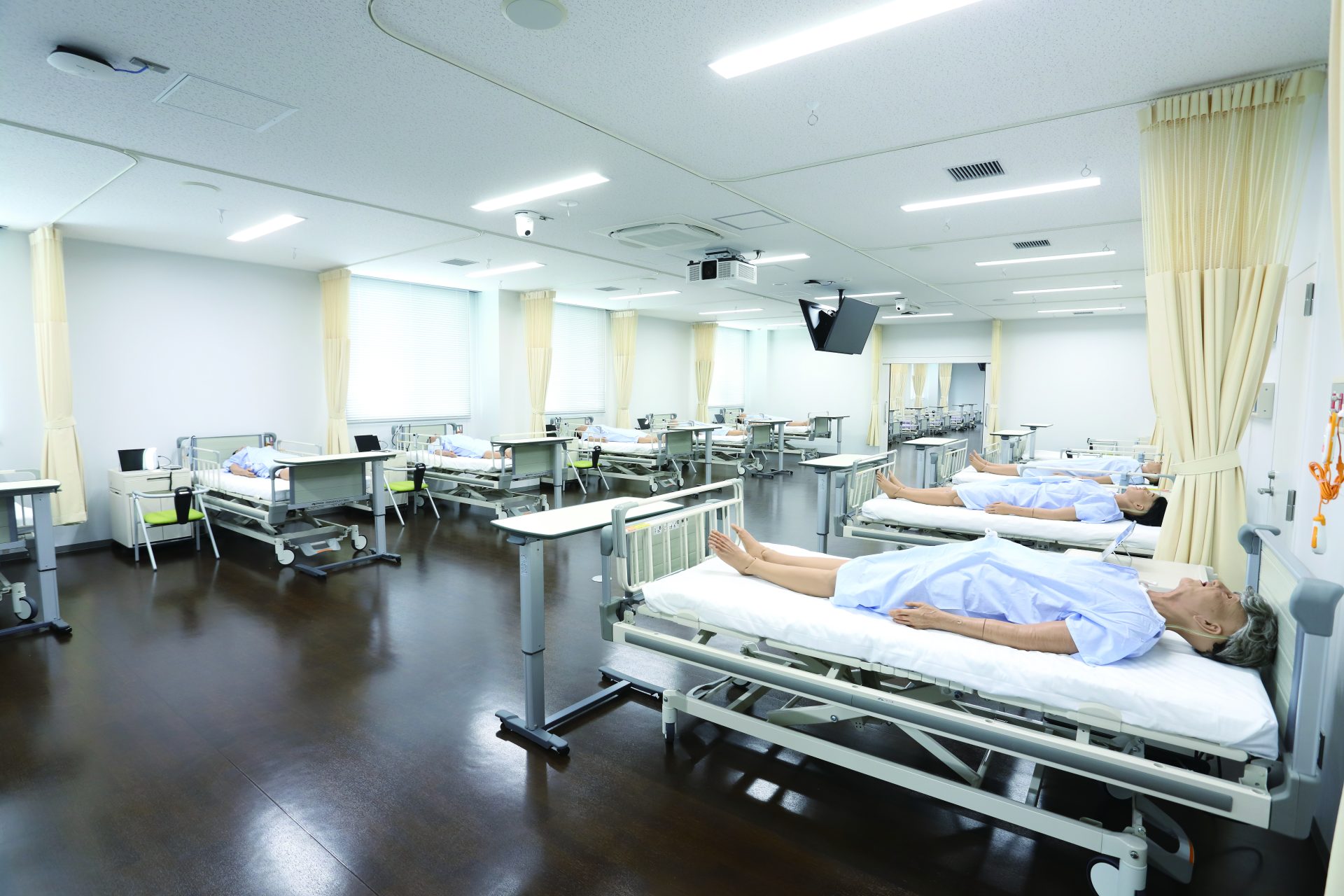
In the new Faculty of Nursing school building, we will set up not only a lecture room, but also a nursing training room and skill slab, introduce simulation education using a large number of high-performance simulators, and provide realistic nursing technical education with the participation of residents in the Shimonoseki area as simulated patients. In addition, a number of seminar rooms and training rooms have been set up to promote independent learning such as group work for students.







